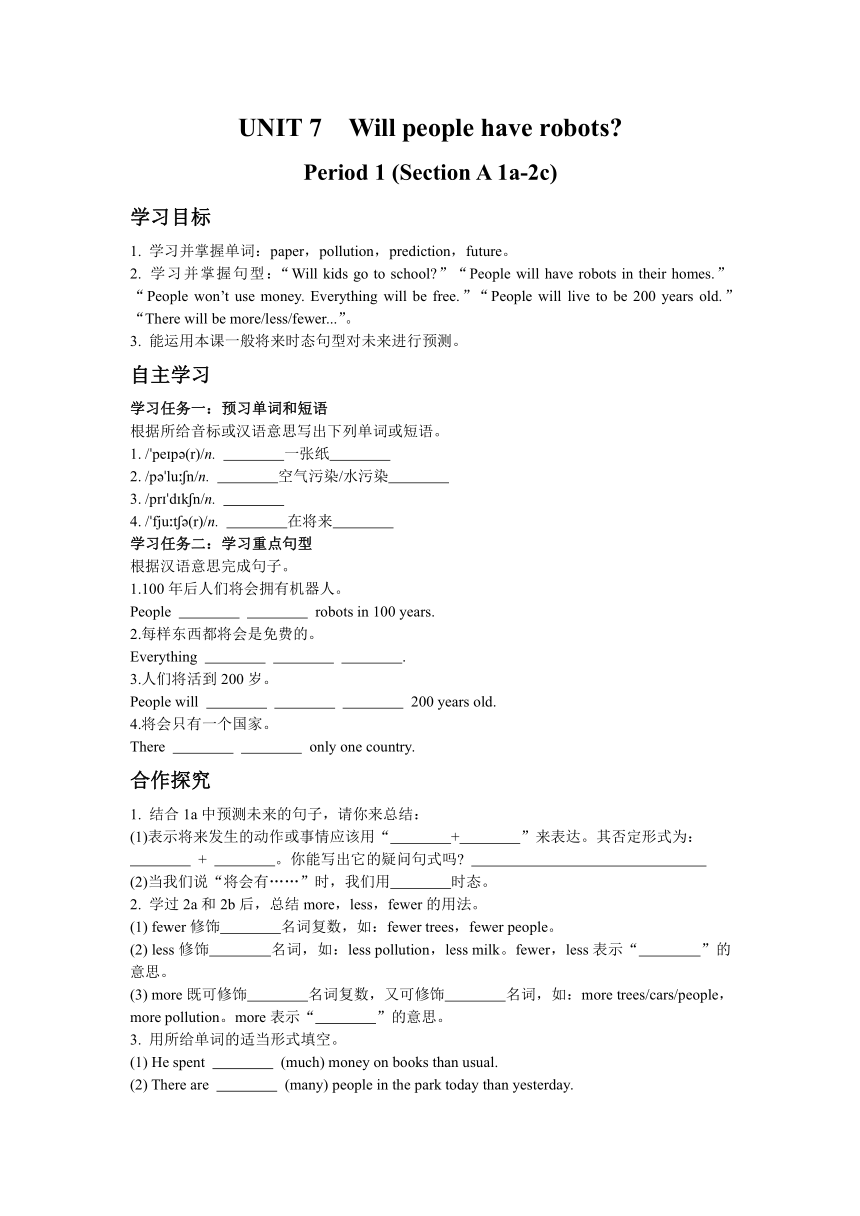人教版八年级上册Unit 7 Will people have robots Period 1 (Section A 1a-2c)学案(含答案)
文档属性
| 名称 | 人教版八年级上册Unit 7 Will people have robots Period 1 (Section A 1a-2c)学案(含答案) |  | |
| 格式 | docx | ||
| 文件大小 | 16.6KB | ||
| 资源类型 | 教案 | ||
| 版本资源 | 人教新目标(Go for it)版 | ||
| 科目 | 英语 | ||
| 更新时间 | 2023-07-19 22:22:47 | ||
图片预览

文档简介
UNIT 7 Will people have robots
Period 1 (Section A 1a-2c)
学习目标
1. 学习并掌握单词:paper,pollution,prediction,future。
2. 学习并掌握句型:“Will kids go to school ”“People will have robots in their homes.” “People won’t use money. Everything will be free.”“People will live to be 200 years old.”“There will be more/less/fewer...”。
3. 能运用本课一般将来时态句型对未来进行预测。
自主学习
学习任务一:预习单词和短语
根据所给音标或汉语意思写出下列单词或短语。
1. / pe p (r)/n. 一张纸
2. /p lu n/n. 空气污染/水污染
3. /pr d k n/n.
4. / fju t (r)/n. 在将来
学习任务二:学习重点句型
根据汉语意思完成句子。
1.100年后人们将会拥有机器人。
People robots in 100 years.
2.每样东西都将会是免费的。
Everything .
3.人们将活到200岁。
People will 200 years old.
4.将会只有一个国家。
There only one country.
合作探究
1. 结合1a中预测未来的句子,请你来总结:
(1)表示将来发生的动作或事情应该用“ + ”来表达。其否定形式为:
+ 。你能写出它的疑问句式吗
(2)当我们说“将会有……”时,我们用 时态。
2. 学过2a和2b后,总结more,less,fewer的用法。
(1) fewer修饰 名词复数,如:fewer trees,fewer people。
(2) less修饰 名词,如:less pollution,less milk。fewer,less表示“ ”的意思。
(3) more既可修饰 名词复数,又可修饰 名词,如:more trees/cars/people,more pollution。more表示“ ”的意思。
3. 用所给单词的适当形式填空。
(1) He spent (much) money on books than usual.
(2) There are (many) people in the park today than yesterday.
(3) We have (many) students this year than last year.
(4) We want to finish the work with (little) money and (few) people.
(5) There will be (many) cars and (much) pollution.
盘点收获
词汇 纸 预言;预测 将来 污染(n. )
句型 在家里人们将会拥有机器人。 将会有更多的污染。 人们将更少地使用地铁。 城市将会大而拥挤。
语法 一般将来时;fewer,less,more 的用法
语言交际 运用所学句型“Will people... ”“There will be...”对未来进行预测并表述自己的观点
当堂达标
Ⅰ. 根据汉语意思完成句子
1. 城市里汽车将会更少,地铁将会更多。
There cars and subways in the city.
2. 一切都将是免费的吗
everything free
3. 这位老人非常健康,他可以活到100多岁。
The old man is very healthy. He can over 100 years old.
Ⅱ. 单项填空
1. There will not be paper money 100 years.
A. for B. in C. ago D. at
2. I think there will be trees and water in the future.
A. less;fewer B. fewer;less
C. less;less D. fewer;fewer
3. There an important meeting this afternoon. All of us should be there.
A. will have B. will hold
C. will be D. has
4. —Will you please do that again
—OK,I won’t.
A. won’t B. can’t C. don’t D. not
5. He is happy because he in a tall building next year.
A. live B. lives C. will live D. lived
学后反思
____________________________________________________________________________________________________________________________________________________________________________________________________________________________________________________________________________________________________________________________
当堂达标参考答案与解析:
Ⅰ. 1. will be fewer, more 该句子为there be句型的一般将来时,“汽车”和“地铁”都是可数名词,分别用比较级fewer和more来表示“更少”和“更多”。
2. Will, be 由所给汉语意思可知本句为一般将来时,其一般疑问句形式是将will提前;be free意为“是免费的”。
3. live to be live to be...意为“活到……”。
Ⅱ. 1. B “for+一段时间”一般用于一般现在时或现在完成时;“in+一段时间”用于一般将来时;ago用于一般过去时;at后不跟时间段。故选B。
2. B fewer“较少的”,修饰可数名词复数;less“较少的”,修饰不可数名词。
3. C there be句型的一般将来时态结构为there will be...或there is/are going to be...,故选C。
4. D “Will you please not do sth. ”意为“请你不要做某事好吗 ”。故选D。
5. C 根据时间状语next year可知从句是一般将来时态,故选C。
Period 1 (Section A 1a-2c)
学习目标
1. 学习并掌握单词:paper,pollution,prediction,future。
2. 学习并掌握句型:“Will kids go to school ”“People will have robots in their homes.” “People won’t use money. Everything will be free.”“People will live to be 200 years old.”“There will be more/less/fewer...”。
3. 能运用本课一般将来时态句型对未来进行预测。
自主学习
学习任务一:预习单词和短语
根据所给音标或汉语意思写出下列单词或短语。
1. / pe p (r)/n. 一张纸
2. /p lu n/n. 空气污染/水污染
3. /pr d k n/n.
4. / fju t (r)/n. 在将来
学习任务二:学习重点句型
根据汉语意思完成句子。
1.100年后人们将会拥有机器人。
People robots in 100 years.
2.每样东西都将会是免费的。
Everything .
3.人们将活到200岁。
People will 200 years old.
4.将会只有一个国家。
There only one country.
合作探究
1. 结合1a中预测未来的句子,请你来总结:
(1)表示将来发生的动作或事情应该用“ + ”来表达。其否定形式为:
+ 。你能写出它的疑问句式吗
(2)当我们说“将会有……”时,我们用 时态。
2. 学过2a和2b后,总结more,less,fewer的用法。
(1) fewer修饰 名词复数,如:fewer trees,fewer people。
(2) less修饰 名词,如:less pollution,less milk。fewer,less表示“ ”的意思。
(3) more既可修饰 名词复数,又可修饰 名词,如:more trees/cars/people,more pollution。more表示“ ”的意思。
3. 用所给单词的适当形式填空。
(1) He spent (much) money on books than usual.
(2) There are (many) people in the park today than yesterday.
(3) We have (many) students this year than last year.
(4) We want to finish the work with (little) money and (few) people.
(5) There will be (many) cars and (much) pollution.
盘点收获
词汇 纸 预言;预测 将来 污染(n. )
句型 在家里人们将会拥有机器人。 将会有更多的污染。 人们将更少地使用地铁。 城市将会大而拥挤。
语法 一般将来时;fewer,less,more 的用法
语言交际 运用所学句型“Will people... ”“There will be...”对未来进行预测并表述自己的观点
当堂达标
Ⅰ. 根据汉语意思完成句子
1. 城市里汽车将会更少,地铁将会更多。
There cars and subways in the city.
2. 一切都将是免费的吗
everything free
3. 这位老人非常健康,他可以活到100多岁。
The old man is very healthy. He can over 100 years old.
Ⅱ. 单项填空
1. There will not be paper money 100 years.
A. for B. in C. ago D. at
2. I think there will be trees and water in the future.
A. less;fewer B. fewer;less
C. less;less D. fewer;fewer
3. There an important meeting this afternoon. All of us should be there.
A. will have B. will hold
C. will be D. has
4. —Will you please do that again
—OK,I won’t.
A. won’t B. can’t C. don’t D. not
5. He is happy because he in a tall building next year.
A. live B. lives C. will live D. lived
学后反思
____________________________________________________________________________________________________________________________________________________________________________________________________________________________________________________________________________________________________________________________
当堂达标参考答案与解析:
Ⅰ. 1. will be fewer, more 该句子为there be句型的一般将来时,“汽车”和“地铁”都是可数名词,分别用比较级fewer和more来表示“更少”和“更多”。
2. Will, be 由所给汉语意思可知本句为一般将来时,其一般疑问句形式是将will提前;be free意为“是免费的”。
3. live to be live to be...意为“活到……”。
Ⅱ. 1. B “for+一段时间”一般用于一般现在时或现在完成时;“in+一段时间”用于一般将来时;ago用于一般过去时;at后不跟时间段。故选B。
2. B fewer“较少的”,修饰可数名词复数;less“较少的”,修饰不可数名词。
3. C there be句型的一般将来时态结构为there will be...或there is/are going to be...,故选C。
4. D “Will you please not do sth. ”意为“请你不要做某事好吗 ”。故选D。
5. C 根据时间状语next year可知从句是一般将来时态,故选C。
同课章节目录
- Unit 1 Where did you go on vacation?
- Section A
- Section B
- Unit 2 How often do you exercise?
- Section A
- Section B
- Unit 3 I'm more outgoing than my sister.
- Section A
- Section B
- Unit 4 What's the best movie theater?
- Section A
- Section B
- Unit 5 Do you want to watch a game show?
- Section A
- Section B
- Unit 6 I'm going to study computer science.
- Section A
- Section B
- Unit 7 Will people have robots?
- Section A
- Section B
- Unit 8 How do you make a banana milk shake?
- Section A
- Section B
- Unit 9 Can you come to my party?
- Section A
- Section B
- Unit 10 If you go to the party, you'll have a grea
- Section A
- Section B
